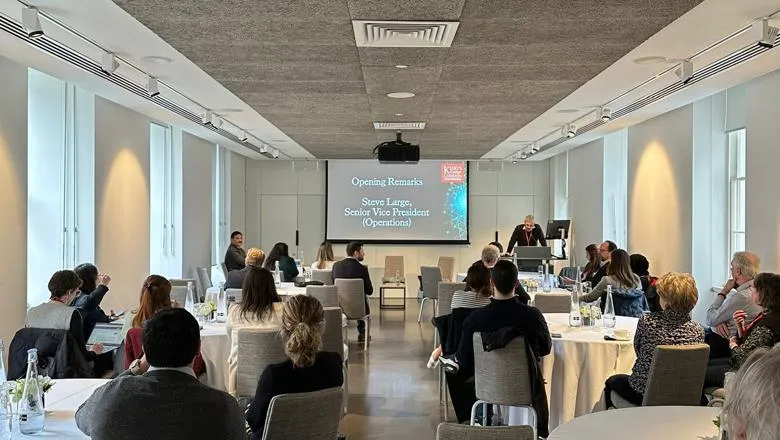The changes we’re making to our new IP Code of Practice, our new equity sharing model, will make the process of research commercialisation more efficient, fast-tracking innovation through a simple, agile model and providing enhanced support for academic entrepreneurs.
Steve Large, Senior Vice President (Operations)
28 May 2024
King's boosts innovation plans by increasing equity stake for founders
King's increases academic founders' equity stake to 80% and introduces new incentives for innovation in revisions to the university's IP Code of Practice.

King’s plans to accelerate innovation are the driving force behind recent revisions to the university’s Intellectual Property Code of Practice. The new founder-first model provides advice and support for researchers – from protecting Intellectual Property (IP) to accelerating their business – all within King’s innovation ecosystem.
King’s new approach aims to make the process of launching a new spinout simpler, faster and more beneficial for entrepreneurial researchers and investors. The policy changes form part of a commitment for the university to lead as an active shareholder in driving commercial impact. The new Code of Practice for IP, Commercialisation and Financial Benefits announced in February 2024 will actively support founders to spin out through:
- incentives for founders that encourage better growth and survival of ventures.
- a simple and consistent deal for all spinout companies.
- balanced and sustainable financial returns for founders and other co-creators.
Specifically, the new IP Code of Practice sets out the terms for the following:
- founders will own 80% of pre-money equity in new spinouts.
- all licensing of IP will be fixed at 1% royalty, with a royalty-free window of £50 million on sales.
- co-creators involved in the licenced IP will now benefit from a share of net income King’s receives through its royalties or share proceeds.
- faculties, departments and inventor labs will receive an income share through a new gainshare policy.
- founders may consult for up to one day a week for 12 months, with faculty approval.
Moreover, co-creators will receive benefit through a share of the proceeds that King’s receives, such as licensing income or sales of shares. Unlike a founder, a co-creator is someone who has been involved in the making of an innovation that has become licenced IP, but is not a founder of the spinout that followed.
King’s has rich and varied high-quality research, whose commercialisation has been proven to generate meaningful impact for the wider UK economy, whether it's across life sciences, engineering or the creative industries. Through the new equity sharing model and the enhanced support for academic entrepreneurs, it is our ambition to further accelerate spinout creation, creating a thriving, interdisciplinary innovation ecosystem.
Professor Bashir M. Al-Hashimi, Vice President (Research & Innovation)
King's innovation ecosystem
The revised IP Code of Practice is complemented by several initiatives that actively support entrepreneurs at King’s. Expertise and resources are available to entrepreneurial students and staff through a suite of three accelerators. The King’s Spinout Accelerator and King’s Startup Accelerator from the Entrepreneurship Institute have been joined this year by London Institute of Health Engineering’s new King’s MedTech Accelerator. All three represent the university’s commitment to a founder-first innovation ecosystem.
The aim is to help researchers with brilliant discoveries access the tailored support at each stage of the commercialisation process, from early ideas up to successful fundraising and investment. Alongside advice on IP and licensing, King’s innovation ecosystem offers spinout founders access to world-class facilities and equipment, support with partnering or grants for research translation, and access to King’s Investor Network. It is hoped that the new approach will inspire more researchers to transform their discoveries into successful spinouts from King’s like Hypervision Surgical, Epsilogen, and Leucid.
This is a really positive move by King’s, aligned with the higher education industry. Universities are a great source of innovation and allowing founders to dedicate time to their ventures in the early stages is crucial. This is an important feature of the updated King’s policy that has been put in place, together with having access to accelerators and like-minded individuals through internal networks.
Dr Elisa Petris, Partner at Syncona Ltd.
For help and support with a new innovation or any advice on the new IP Code of Practice, please contact the Innovation@King’s team at innovation@kcl.ac.uk.

